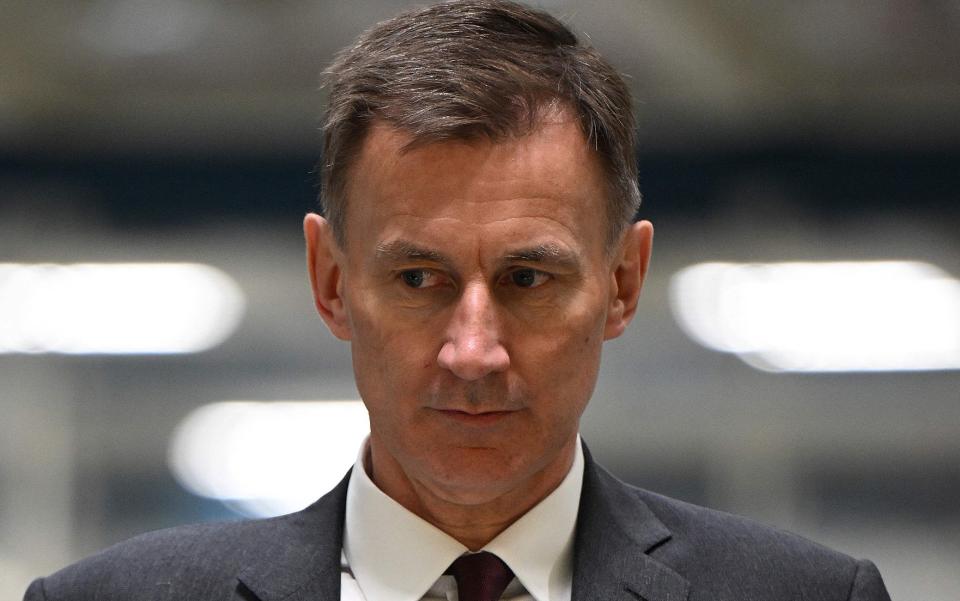Early rate cuts in doubt after Hunt tax raid

Jeremy Hunt’s cigarette tax raid has fuelled a shock rise in inflation, official figures show.
Inflation rose for the first time in nearly a year in December, climbing from 3.9pc to 4pc. Economists had been expecting the rate to fall to 3.8pc.
Grant Fitzner, chief economist at the Office for National Statistics (ONS), said the surprise increase came from “rises in tobacco prices due to recently introduced duty increases”.
The Chancellor increased the tax on cigarettes and other tobacco products by 2pc above the retail prices index (RPI) and hand-rolling tobacco by 10pc-12pc above RPI in the Autumn Statement, with the changes taking effect at the end of November.
The latest increases to duty added 66p to the price of a packet of 20 cigarettes, and £2.21 to a 30-gram packet of hand-rolling tobacco. It comes on top of the previous jump in duty in March 2023.
As a result, the average packet of 20 cigarettes cost £13.30 in November, the ONS found, up 17pc from £11.37 a year earlier.
A standard pack of hand-rolling tobacco hit £22.07, up almost one-quarter from £17.84 in November 2022.
The shock rise in inflation may delay rate cuts by the Bank of England. Policymakers were expected to begin lowering borrowing costs from a 15-year-high of 5.25pc within months.
Melissa Davies, chief economist at Redburn Atlantic, said: “It is far from clear that the Bank of England’s job is sufficiently done to allow a swift series of rate cuts, as expected by the market.
“In fact, there are a number of reasons the Bank should hold the line on rates into the second half of the year and then proceed slowly with cuts. Wage inflation remains elevated, services inflation is high and sticky, while goods inflation is poised to bounce in the face of renewed supply chain pressures.”
The closely watched measure of core inflation, which strips away volatile elements like food, energy, alcohol and tobacco, remained at 5.1pc in December. It suggests that inflation is still widely embedded in the economy.
Mr Fitzner told Radio 4’s Today Programme that while inflation has fallen a long way from the peak of 11.1pc in October 2022, the final stretch to get it back to the Bank of England’s 2pc target “may take a little while”.
He said: “The big falls have been driven by falls in energy prices and goods prices, and a lot of those have been reflected in the inflation rate we see today.
“To get down from 4pc to 2pc you really need to see a reduction in what we call core inflation, so that strips out some of those volatile items like food, energy, alcohol and tobacco, and I think you would also need to see further falls in services inflation, which tends to be somewhat more sticky than goods price inflation.”
Alcohol and tobacco prices were 12.9pc higher in December compared to a year earlier, with the inflation rate accelerating from 10.2pc in November.
Mr Fitzner added: “These were partially offset by falling food inflation, where prices still rose but at a much lower rate than this time last year.”
Falling food inflation and flat factory gate prices from manufacturers indicate much of the pressure on costs has “abated”, he told the BBC.
The average grocery shopping basket cost 8pc more in December compared to a year earlier, down from 9.2pc the previous month.
Mr Hunt said: “As we have seen in the US, France and Germany, inflation does not fall in a straight line, but our plan is working and we should stick to it.
“We took difficult decisions to control borrowing and are now turning a corner, so we need to stay the course we have set out, including boosting growth with more competitive tax levels.”
ONS figures showed that the retail prices index fell from 5.3pc to 5.2pc in December.
The older measure of inflation determines the annual price increases of anything from phone bills to rail tickets. A quarter of the government debt is also linked to it, meaning a fall brings instant benefits to the public purse.

 Yahoo Finance
Yahoo Finance 